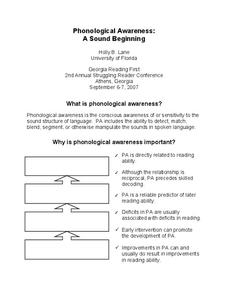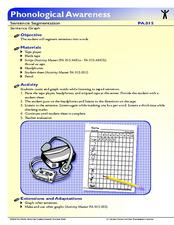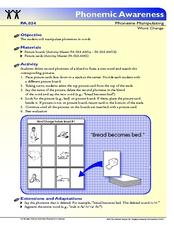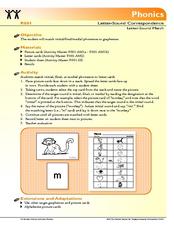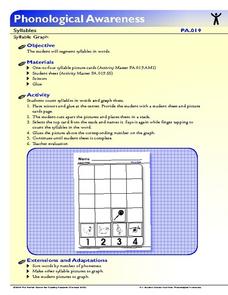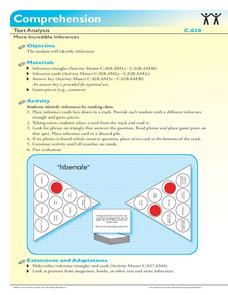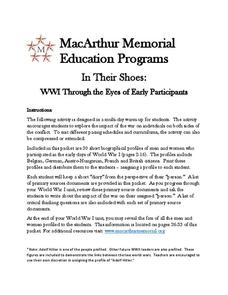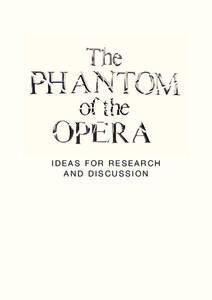Curated OER
If You Take a Mouse to School Maze Activity
Every good book deserves a few good activity sheets to go with it. After reading If You Take a Mouse to School with your class challenge them with a fun maze. They'll have to get Mr. Mouse through the maze so he can hang out with his...
Council for Economic Education
Wages and the Black Death
While the Black Death wiped out a third of Europe's population during the Middle Ages, its destruction paved the way for better wages for workers and even an early form of modern capitalism. The relationship between the cataclysmic event...
Lerner Publishing
Teaching Vowel Combinations
Need some fun activities to augment your lessons on vowel patterns and phonemic awareness? Peruse a series of worksheets designed to help little ones with their early reading skills.
University of Florida
Phonological Awareness: A Sound Beginning
Choose from a variety of phonological activities to complement a reading lesson. The guide goes through the basic components of good phonics instruction focusing on sound types, levels of phonological awareness, assessment methods, and...
Florida Center for Reading Research
Phonics: Encoding and Decoding, Letter Cube Blending
Emergent readers use a letter cube to identify, blend, and make words. They roll each of the three-letter cubes, mark down the letters they rolled, then blend the letter sounds together to make a word. They record each word on a...
Florida Center for Reading Research
Phonics: High Frequency Words, Sand Paper Words
Learners use a stack of words embellished with tactile elements, such as sandpaper, to practice high-frequency words. Pupils trace the tactile surface of each letter in the word, write it on their paper, then find and glue that word from...
Florida Center for Reading Research
Phonological Awareness: Phoneme Matching, Final Phoneme Pie
Words are interesting things—you can change them by adding or subtracting phonemes. Here, emergent readers change the pictures on their phoneme pie by removing or adding various final phonemes. A fun way to build phonetic competency!
Florida Center for Reading Research
Phonics: Onset and Rime, Change-A-Word
Kids use their phonological know-how to identify and segment onset and rime blends. Double rime picture cards (cat and hat) are chosen, then matched to onset cards that make each word, such as the k sound for a cat and the h sound for a...
Florida Center for Reading Research
Phonological Awareness: Phoneme Matching, Pack-a-Backpack
Scholars sort words based on their initial phoneme or sound. Learners are given two backpacks, each with a picture card; they search and match picture cards with the same initial sound as the ones on each backpack.
Florida Center for Reading Research
Phonics: Encoding and Decoding, Make-A-Word
Little learners place a picture card on a magnetic board, say the name of the object on the card, then sift through alphabet magnets to find and spell the word they said.
Florida Center for Reading Research
Phonological Awareness: Sentence Segmentation, Sentence Graph
Young scholars segment sentences while they listen to a series of sentences. Using a graph, pupils make a mark for each word they hear. Learners listen to each sentence three times; once to listen, once to mark, and once to check their...
Florida Center for Reading Research
Sound it-Bag it
Scholars sort picture cards based on the initial phoneme they hear as they say the name of each image. They pick a card, say its name, then place it in one of five bags based on how its initial phoneme matches the initial phoneme...
Florida Center for Reading Research
Phonological Awareness: Phoneme Manipulating, Word Change
Once your scholars know their letter sounds and recognize them in words, have them try making new words by manipulating phonemes. Pupils are given a word change picture board and a stack of word pictures. They pick a card and place it...
Florida Center for Reading Research
Phonics: Letter-Sound Correspondence, Letter Sound Match
Scholars match initial, medial, and final phonemes to individual graphemes. They pick a card, say its name, then find the letter that makes that sound. If the card is a monkey, the learner finds the letter m, matching the grapheme to the...
Florida Center for Reading Research
Phonological Awareness: Syllables, Syllable Graph
Scholars make a pictograph based on the number of syllables in each picture card. They choose a card, say the name of the object on the card, break the word into syllables, count the syllables, then glue the picture onto the number chart...
It's About Time
Monitoring Active Volcanoes
The fastest growing volcano in recorded history grew more than 150 meters in less than a week and to more than 424 meters in less than a decade. How do we safely monitor active volcanoes? Young scientists design an instrument to measure...
Florida Center for Reading Research
Phonological Awareness: Phoneme Matching, Sound Bags
Peers pair up to find, identify and match medial phonemes. Peer one pulls a card or object from a bag, names it, then says its medial sound.—peer two attempts to find a picture or object whose medial sound matches the partner.
Florida Center for Reading Research
Comprehension: Text Analysis, More Incredible Inferences
Reinforce inference skills with a learning game! Scholars read scenarios on cards and match them to a written inference on the triangle. The first pupil to match all their inferences wins!
Florida Center for Reading Research
Vocabulary: Morphic Elements, Compound Word Trivia
Engage young learners in expanding their vocabulary with a fun game. Scholars learn how compound words provide clues about the meaning of unfamiliar vocabulary. Pairs take turns reading a definition, locating its corresponding compound...
Florida Center for Reading Research
Phonics: Variant Correspondences, Fishing for Vowel Digraphs
After teaching vowel digraphs, reinforce the concept with an activity! Young scholars fish from a pile of 60 cards to match words with the same sound. Featured vowel digraphs include ea, au, aw, ow, oa, ai, ay, and ee.
Curated OER
Bugs
This is not just a worksheet, but an entire set of activities and worksheets that can accompany any unit on bugs or insects. Little learners will hone early math and literacy skills as they create mini-books, discriminate between big and...
Florida Center for Reading Research
Letter Recognition: Poetry Pen
It's always nice to have a great idea and all the tools to make it happen. The class can use these nursery rhyme and alphabet cards to teach each other letter recognition and letter sound correspondence. There is a full set of alphabet...
MacArthur Memorial
In Their Shoes: WWI Through the Eyes of Early Participants
Several social activities provide showcase the perspective of many prominent figures in World War I history. Students read an assigned case study about a memorable person and complete several activities to further understand this...
Phantom of Opera
The Phantom of the Opera: Ideas for Research and Discussion
You could spend a full day discussing The Phantom of the Opera and not scratch the surface, but a set of lessons about the literary elements and themes of the musical production is a great start. Young thespians build upon the background...





